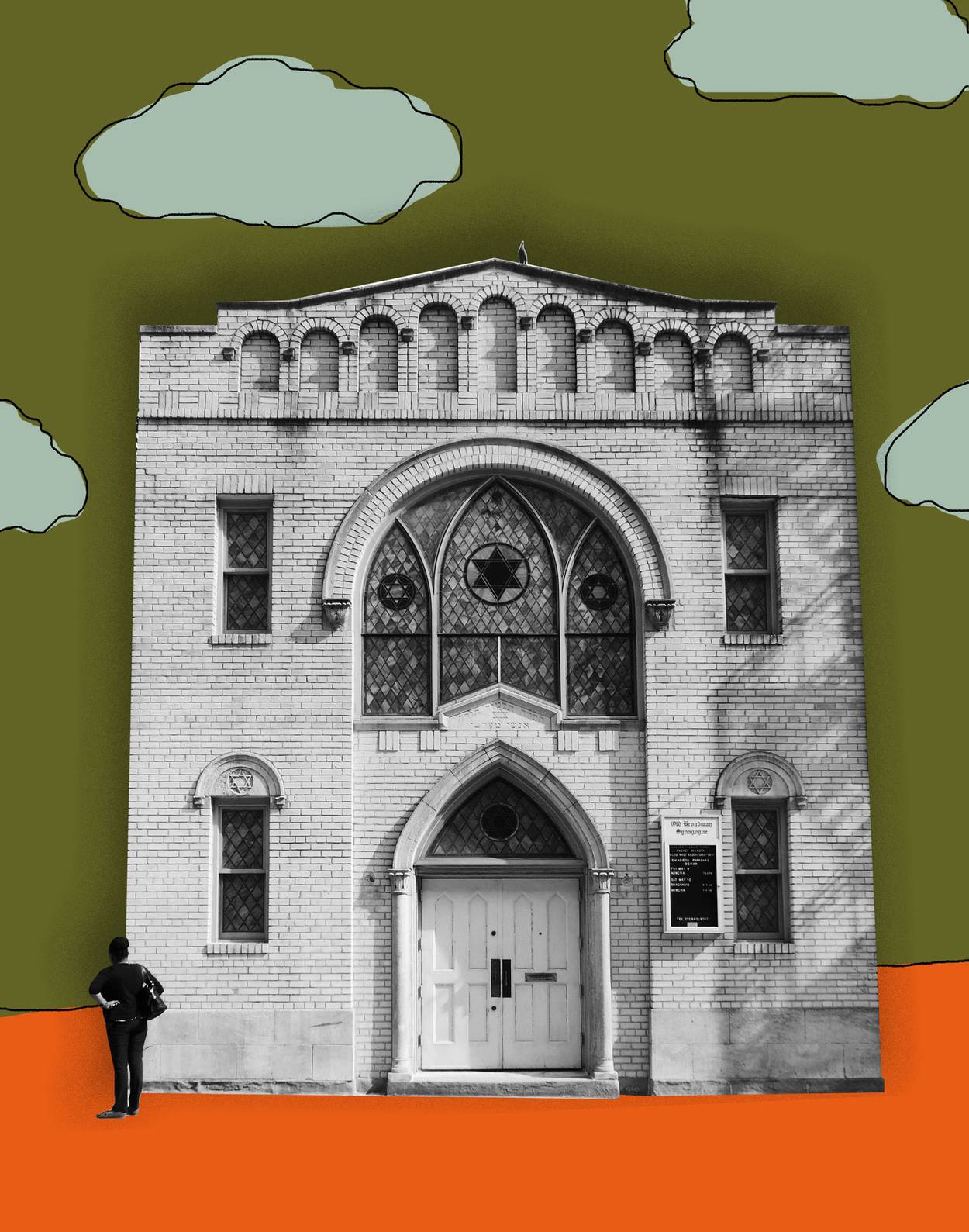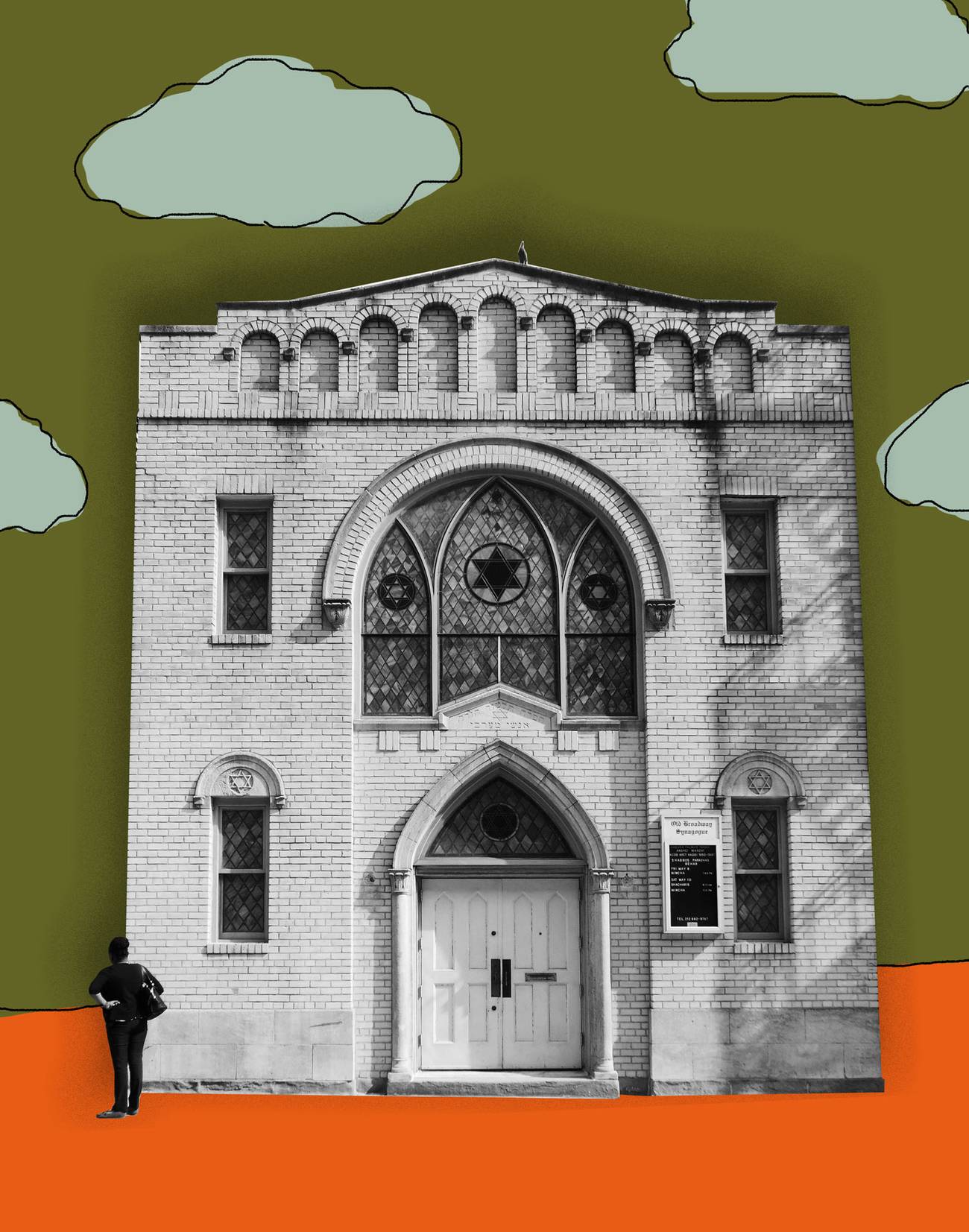Old Shul
Pinny Bulman’s new book of poems about the lost Jewish world of Washington Heights

Original photo: Wikipedia

Original photo: Wikipedia

Original photo: Wikipedia

Original photo: Wikipedia
Mr. and Mrs. Bulman named their son Paul after his great grandfather Pinchos. As a boy he acquired the nickname Pinny, which stuck through the years. It’s as Pinny Bulman that he writes and publishes a brand of poetry that might be described as Jewish American confessional. His newest book, old shul (Ben Yehuda Press, 2023), which his publisher calls a “bildungsroman,” explores the author’s boyhood growing up in Washington Heights in northern Manhattan, once a thriving Jewish neighborhood, with Orthodox synagogues and worshippers—including Pinny himself—that fell on hard times.
For many years, Pinny belonged to the Washington Heights Congregation at 179th Street and Pinehurst Avenue, next to the entrance to the George Washington Bridge, the biggest landmark in the neighborhood. old shul, which is divided into two parts, “old shul” and “beyond shul,” maps the decline and fall of Judaism in that neighborhood, and the impact of its disappearance on the poet himself, who appears in many of the poems finding both beauty and truth in the ruins around him.
Over the course of more than 100 poems that offer little sentimentality or schmaltz, old shul asks questions and seeks answers by way of personal, local, and autobiographical musings and meditations. These musings examine the world of Washington Heights from its highs and its lows, its sorrows and its joys, the distant past, the immediate present, and a future as yet unborn.
The first poem in the book, “hanging on,” sets the stage for the work that follows with the stench of the streets, shrieks that recall the Shoah and phrases such as “metal cages,” “empty benches,” “tired voices,” and “worn prayers.” They might make one wonder: Where are we, exactly, in a prison cell, in exile, banished from the Promised Land, in Germany in 1938?
The last poem in the book, “come away,” ends with the words “come away,” and invites members of the shul both near and far, actual and imagined, to pull the “wilderness” over their heads and follow “our pillar of fire.”
Such poems, with their images of rats and rust, decay and death, guilt and genizah, are not for the faint of heart, who crave fairy tales and happy endings. You who enter here might remember the prophet of the Old Testament in a den of lions, and would be advised not to forget Kristallnacht, when hundreds of synagogues were destroyed and tens of thousands of Jews arrested and dispatched to concentration camps. Still, Bulman doesn’t beat readers over the head with the facts of actual, historical fascism. He practices subtlety and restraint.
The book is also filled with great attention to the musicality of language. The third poem in old shul is about the “primordial language of Babel” and also about improvisation, which is spelled “imp0v1sati0n” in the title. In “bikes,” meanwhile, white space creates shape and meaning.

Alliteration works nicely in “ninevah”—“these shore rocks / are still slippery.” The words themselves sound slippery. Memorable phrases such as “desperate softness” and “nomadic hands” amplify the noirish atmosphere of the poems, while the judicious use of Yiddish words like shtiebel and minyan provides a sense of authenticity.
What stands out most in this collection, though, is Bulman’s sense of empathy for the elderly Jewish men and women in Washington Heights, and for the young, newly arrived immigrants from the Dominican Republic, that keeps the reader wide awake and engaged. The past, present, and future of this neighborhood appear in tragic and beautiful detail in the pages of this book which is meant for special occasions, whether Passover, Hanukkah, Shabbat or for any day of the week.
Bulman’s latest collection maps the decline and fall of Judaism in Washington Heights, and the impact of its disappearance on the poet himself.
With his wife and two children, Bulman now lives in the Bronx and works as a pediatric psychologist. “I started writing at age 16, typical dark existential teen angst poetry,” Bulman told me. “But I didn’t start to write poetry as a vocation, as a need, until after my dad died in 2002 when I was 29.” Pinny’s father, Aaron Bulman, “was a wonderful poet published in [The] Paris Review and [The] Partisan Review,” Pinny says, “but he never received much publicity or recognition.”
Ben Yehuda Press, which has published old shul, runs the highly esteemed “Jewish Poetry Project.” The press puts into print dozens of books by Jewish poets as well as nonfiction books for both secular and religious Jews, including many works written by rabbis. Ben Yehuda’s bestsellers include Torah in a Time of Plague and Torah Without End. Not surprisingly, it has demonstrated that there’s a real market for books by, for, and about Jews, who are fittingly known as the “people of the book.’' That market is not just among Jews, but among readers of all denominations and persuasions. The website for the press puts it poetically: “we see the larger Jewish community for the Noah’s Ark that it is, for the Tower of Babel that it is, and for the Garden of Eden that it can be.”
Readers who want to view Bulman as a foe of antisemitism and fascism will find that aspect of his identity in old shul. Indeed, he’s intensely sensitive to the sweep of history, especially to its catastrophes and crises, the pogroms and the gas chambers. In “swastika,” Bulman writes that a “small anonymous nazi pinwheel” which he notices in the neighborhood pushes him “to action / to go out that night armed / with a black sharpie … / blot out the swastika / mark up the area with Jewish stars.” In “jerusalem” he’s quietly defiant and profoundly spiritual. “I will not be silenced,” he writes. “My prayers will echo / off these indifferent stones / if only for a moment.”
It’s unsurprising that Bulman has absorbed the barrage of images and news stories from Israel and Gaza on a personal as well as a political level. He recently told me that “On October 7th, my aunt and uncle, their children, and their grandchildren were trembling in unlockable bomb shelters on Kibbutz Saad as friends of theirs were being murdered and kidnapped across the road in Kfar Aza.” He added: “My family members have been displaced for months from their home of many generations with no timetable on when they might be able to return or how a return may impact the PTSD so many of them are experiencing.”
At the same time, Bulman says that he has kept “his heart open” and that his “prayers are for a true lasting peace and a process that leads to an end result such that everyone is able to live their lives with dignity and safety.”
One expects no less from the author of old shul, who observes in the poem “copernicus” that “we can’t be / the center of creation” and that “creation lies within destruction.” Though in the last line he wonders, “or is it the reverse?”
Jonah Raskin, professor emeritus at Sonoma State University, is the author of 14 books, including biographies of Jack London, Allen Ginsberg, and Abbie Hoffman. His new book of poetry is The Thief of Yellow Roses (Regent Press).